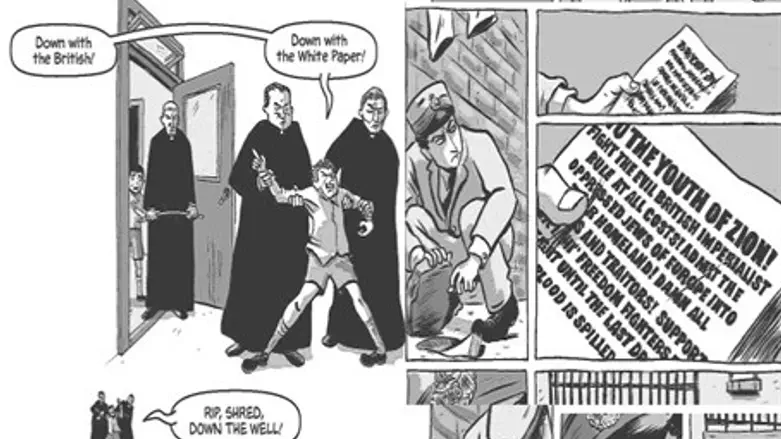
American film producer and screenwriter Boaz Yakin is best known for successful movies like Remember the Titans, Fresh, and 2013's Now You See Me. But his latest release isn't a movie, but a graphic novel based on his own family's experiences.
The trials and tribulations of the pre-1948 Jewish resistance groups Irgun (also known by its Hebrew acronym ETZEL) and Lehi - including difficult historical incidents like the bombing of the British Officers Club and the Deir Yassin battle - are all dramatized in graphic black-and-white drawings.
But Yakin's vision was not to create a historical document; the result is a poignant and emotional novel about one family's struggle.
For the full podcast click here.
Yakin spoke to Arutz Sheva from his home in New York about the project.
"The book is inspired by my father and uncles' experiences in Jerusalem in the 1940s, but it's also heavily fictionalized and draws from a number of people I interviewed," he explains. The Yakin family, like the fictional Halaby family of the novel, were born in Syria and immigrated to Israel in the late 1800s. Yakin's own parents moved to France where they became theater instructors before moving to New York, where Yakin was born and raised.
The book is not meant to be "hasbara" or pro-Israel advocacy, but tells a multi-faceted story of interweaving, realistic characters. One particularly memorable scene is when two of the Halaby brothers get into an argument over hanging a Communist poster in the house verses an ETZEL poster, something based on a real family incident.
Another brother, named Ezra, is loosely based on Yakin's real life uncle Ezra Yakhin (sometimes spelled Yachin). The elderly veteran of the Lehi today is well-known for his lectures at army bases around the country, telling his tale of being a young post office employee turned Jewish revolutionary.
Some scenes in the graphic novel reflect Yachin's autobiography "Elnakam," such as passing out flyers deemed illegal by the British under the guise of delivering the mail and eventually getting into violent shoot-outs with British police.
The real drama of the story comes from the characterization of a family trying to keep it all together just after the Holocaust and just before Israel's War of Independence. Characterizations of Arabs, hareidi Jews, secular communists and the British are shown with a sense of humanism that does not try to push a certain viewpoint. For example, the depiction of the battle of Deir Yassin shows multiple sides of the story, unlike many of the contemporary narratives,
"At the end of the day I guess you would have to say I'm a Zionist because I'm happy Jews have a place in Israel," Yakin comments.
"But I think you can be a Zionist and support Jews living in Israel and also have a clear eyed perspective about the pain and turmoil that happened. I think people tend to seek simplicity where there is none. People will inflict and create a narrative that will support their point of view. But I think its possible to support something and still be clear-eyed about its effects," he adds.
"This book is about loss of innocence and the difficult and painful things that sometimes have to be done when you're trying to survive.
"When I spoke with my family, even before I wrote the book, within the same family there were communists and right-wing and left-wing. It's such a small place geographically and there were so few people, and yet everything that happens there seems to resonate outwards so strongly," Yakin added.
"For such a long time, for several millennia, anything that happens in Israel between just two or three people seems to blow up into a kind of mythology that extends to the entire Western world."
For the full interview, download the mp3 by clicking here.
Ben Bresky is a music journalist living in Jerusalem. He hosts The Israel Beat Jewish Music Podcast interviewing a wide range of Jewish and Israeli musicians from Carlebach to klezmer, from hassidic to trance. For mp3 archives click here. For Facebook click here. For Twitter click here.